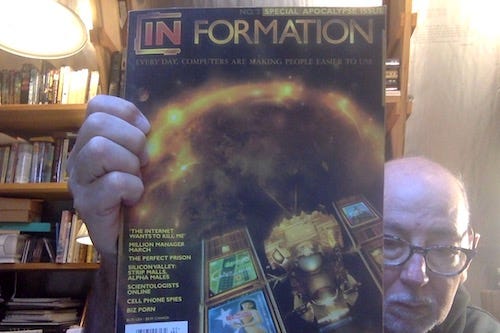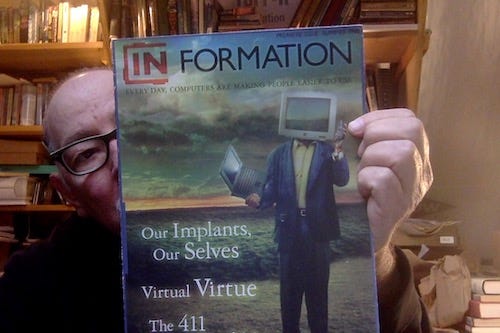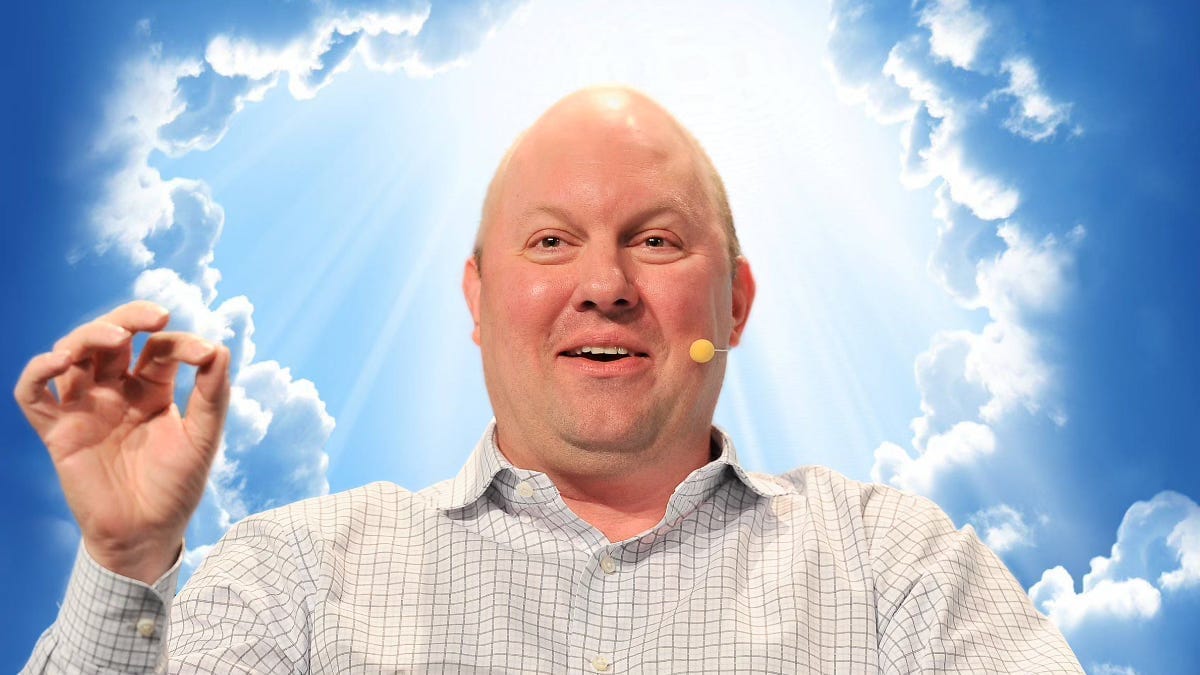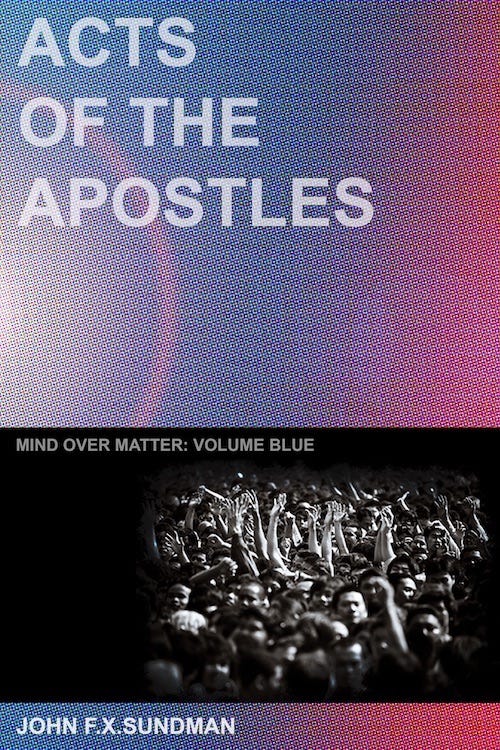Précis
Some musings on the nature of cults and religion, with particular regard to how these phenomena present themselves among the technophilic elites, admixed with a lumpen proto-essay on the nature of essays. A correspondence between Sundman figures it out! and the Essais of Michel de Montaigne is presumptuously imputed. A book giveaway is advertised. This post concludes with a tease concerning a possible connexion between the sixteen century French Montaigne and a certain twentieth century American Montaigne who was the very incarnation of technophilic elitism. The latter Montaigne of course being better known to readers of the works of a certain biodigital novelist by his sobriquet Monty Meekman.
New here?
On Sundman figures it out! themes emerge, interleave, dance around, fade away, and sometimes reappear — like fireflies, it has been said. The most darling little fireflies, fluttering in a maze of twisty passages all alike, flickering on and off, silently singing I was around, I was around, I was around. Incidents ramify and their import may change upon being revisited. Ephemeral lightning-bugs of memory and insight flashing and floating in a twisty maze of passages, no two of them the same. Wherefore the more Sundman figures it out! posts you read, the more connections you’ll see & the more fun you’ll have. (What do you consider fun? What I consider fun is fun, natural fun.)
The Cults of In Formation
In an earlier installment of this ongoing meditation I mentioned that I have been invited to contribute an essay on “Cults and Religions of Silicon Valley” for the forthcoming Special Singularity Issue of David Temkin’s In Formation magazine.
Some of the ideas presented below will be dissected and cobbled back to monstrous life in that In Formation essay. You will certainly be hearing more from me about that.


I had a newsletter, on Mailchimp
Before there was Sundman figures it out! on Substack, there was my newsletter Technopotheosis. I published 16 issues between November 2016 and February 2021 but as the daily reality of living in pandemica covidium set in I lost interest. Were you a subscriber to Technopotheosis whom I dragged over here? If so, thanks for sticking around! Please leave a ‘hello’ in the comments!

Most issues of of Technopotheosis began with some variation of this boilerplate introduction:
[‘Technopotheosis is] just a word I made up from 'technology' and 'apotheosis', which means 'to deify or raise to a god-like stature.' It's mostly about art, ethics, synthetic biology & my glamorous life as unknown literary genius /retired { volunteer firefighter | underpaid construction laborer}.
That is to say, the very name ‘Technopotheosis’ implies a new kind of religion in which the deity is technology — especially the kind of digital technology associated with California’s Silicon Valley and the synthetic biological technology associated with Boston and Cambridge, Massachusetts (among many other places).1
Note: when you say to yourself the words “I had a newsletter, on Mailchimp” you should try to hear them in the cadence of the character ‘Karen,’ as portrayed by Meryl Streep, when she says, at the beginning of that famous film, “I had a farm, in Africa”:
So many Meryl Streep’s most famous performances are quite magnificent, but as far as I’m concerned her best work is actually quite obscure: it’s her reading of The Tailor of Gloucester, by Beatrix Potter. You must hear her saying ‘no more twist’ in an impossibly high and squeaky mouse voice. It’s absolutely darling.
Back Porch Winter Update
Readers of the epic prolegomenon A Scared Firefighter Up In the Bucket (part one, part two, part three) will recall how that essay started out ostensibly being about the only time I ever got scared during my ten year firefighting career but kind of mutated into a bunch of digressions on the philosophy of mind, the history of AI chatbots, recollections of a dinner party featuring Douglas Hofstadter and Daniel Dennett, and the wonders of the seasonal garden my wife creates anew each year on our back porch — a bucolic bower that has occasioned both perfect serenity and sheer existential terror.

I spent a couple of hours last week decluttering that back porch, which had become, due to my neglect at autumn’s end, an unsightly mess, a depressing view.
So I removed the 40 flowerpots (from size 1-cup to 100 pounds, all populated with remains of withered plants), and the mildew-stained umbrella over the round table, and various tools and implements, and the hummingbird feeders. I moved all the gargoyles and statues to one of the two sheds in the back yard, and I raked all the leaves off the porch and into the woods. I swept the planks with a big push broom, and then, finally, I arranged all the remaining porch furniture against the far railing as elegantly as I could.
The little room that opens onto the back porch via sliding door has been Betty's bedroom for a few years now, since her unsuccessful back surgeries, as our stairs are now not only inconvenient for her but also dangerous. Most nights I sleep in that room on air mattress next to my wife’s bed. The day after neatening the porch I awoke up around dawn. It was raining lightly and the back porch, all browns and greys, with its veritcal and horizontal lines of porch railing and furniture, looked like some kind of Japanese etching, or maybe a cover of The New Yorker.
Technopotheosis is everywhere these days
A little while back, on the occasion of venture capitalist Marc Andreesen publishing a silly little screed called The Techno-Optimist Manifesto, I wrote an essay here called Marc Andreesen Was Going to Debug the Internet or Die Trying. Andreesen’s Manifesto seemed to get under people’s skin, and a new category of essay came into being — the Anti-Andreesen Manifesto. These AAMs often pointed out that techno-optimism has religious overtones, and that followings of personalities like Elon Musk have a cult-like feel to them.
A recent essay by well known techno skeptic Paris Marx is typical. It’s called The religion of techno-optimism; the tag line is “Tech billionaires are using faith to solidify their power.”
I’m generally sympathetic to Marx’s point of view, but he nowhere defines what he means by ‘religion’ and is pretty hand-wavy about how Andreessen is using ‘faith’ so I basically find this kind of article lazy and not especially helpful.
The notion of a religion of technology, of technopotheosis, whose Mecca is Silicon Valley is all the rage these days. But as always when this topic comes up I feel compelled to point out that I published my novel about a religion of technology centered around an evil genius Silicon Valley billionaire/technologist and would-be messiah, Acts of the Apostles, just before Christmas, 1999. So, like, twenty-five years ago. The observations by Marx et al are not especially original.
There was a reason that I chose Acts of the Apostles as the name of my book. The original book called Acts of the Apostles is included in the so-called New Testament. Its author is generally considered to be Luke, author of The Gospel of Luke, one of the four Gospels. Acts of the Apostles tells the story of the very early church — how, after the crucifixion of Jesus, his followers went about spreading the “good news” — that is, how they created and spread a new religion, which is known today as Christianity. So implicitly I was saying that there existed in Silicon Valley something akin to a cult, a new religion.
I don’t plan to write a dissertation, but my little essay in In Formation about cults and religions of Silicon Valley will be at least a little more rigorous in the use of those words.
Gibbs vs Montaigne
The French nobleman Michel de Montaigne is generally credited with having invented the literary form we call the essay. According to Wikipedia, “[Montaigne’s] work is noted for its merging of casual anecdotes and autobiography with intellectual insight.” Montaigne is the patron saint of Sundman figures it out! Before I push that ‘publish’ button on any post I ensure that it has the perfect mixture of casual anecdote, autobiography and intellectual insight.
My friend Mark Gibbs thinks my approach to this newsletter you’re now reading is all wrong. He says my Sundman figures it out! essays are too long. “We’re in the age of Tik-Tok” he says. “Attention spans are short. Nobody is going to take fifteen minutes to read your meandering autobiographical essay no matter how exquisitely you have composed it. If it takes longer than 3 minutes to read it, it’s too long.”
Mark also thinks that my choice of topics is misguided. He thinks I should make short pithy observations, and, if possible, give actionable suggestions.
Here is a reconstructed exchange between me and Mark:
Mark: Why do you have a newsletter? Because you want people to buy your novels. Your books are cyberpunk. They’re about the convergence of biological and digital technology. That’s what you should write about. You should write about stuff that’s in the news. Be topical. Tell people how your books relate to what's happening in their worlds today. Nobody wants to read about you milking your goddamn cow in 1957. John: I wrote about that 'biodigital convergence' stuff in Technopotheosis. I'm tired of doing that. It's too enervating. It’s exhausting. M: Boo hoo. J: By the way, don’t ‘cyberpunk’ me. Cheap Complex Devices is more Nabokovian, more Borgesian than it is Gibsonian. M: Do you want to sell books or write your autobiography and literary theory bullshit that nobody’s going to read? J: I like Sundman figures it out! M: Technopotheosis was better.
I should point out that in point of fact I only have one style of writing essays and there really is no discernible difference, in either style or substance, among any of my various newsletters, blog posts and the like. As Mr. Ristucci, of Singac, New Jersey, said to the seventeen year old me, “It’s a no diff; only the bag” (a story for another time).
But for the sake of argument let’s pretend that it would be possible for me to write a newsletter in the short, pithy, topical style towards which my friend Mark keeps pushing me. Something like
SUNDMAN ON GARDENING
In today’s newsletter we will talk about how to grow the best tomatoes, and how to get the most enjoyment from doing so!
When the nice weather comes, pick up some starter plants from one of the nearby nurseries. Be sure to chose the best varieties.
Plant them in good soil in containers of appropriate size on your back porch.
Ensure that your growing plants get the right amount of sun and water. Also consider using some fertilizer.
When the tomatoes are ripe, harvest and eat them.
If you follow my instructions you will have great success, and much fun too!
Happy gardening!
Until next time,
jrs
That is the kind of newsletter that my friend Mark wants me to write. My friends David Temkin and John Biggs tell me the same thing, by the way. Mark, David, John and several others as well.
This, below, is from J.M. Cohen’s 1958 introduction to the Penguin Classics edition to Montaigne’s Essays, of which Cohen was the translator:
Montaigne’s Essays are, in effect, an extended autobiography, the only one ever to be written this way. Other autobiographies begin with the writer’s birth, and cary on, with more or less digressions, to that moment when he picks up the pen to sketch out his first chapter. Montaigne, however, does not proceed along the line of time; he does not tell us what event succeeded other. His aim is to present a portrait of himself in a frame of timelessness; to build up from a number of partial sketches the essential man; not as an unchanging being, but as one who retained a core of identity more important as a subject than the events which befell him. [. . .] [H]e makes a number of trials — for such is the meaning of the word essai, which he invented as a literary term — in order to test his responses to different subjects and situations. He writes on education and friendship, on the uncertainty of our judgment and on the strength of the imagination, or develops what appears to be an entirely wayward reflection on the subject of cannibals or coaches. But all the time he is making a trial of himself and his opinions, in an endeavor to see which of them are permanent and which temporary; which of them arise from the passing circumstances of his life and the particular climate of his times, with its pedantic scholarship, its religions dissensions, and its cruel civil wars, and which of them belong to the man himself, Michel de Montaigne.
So what do you think? Should I take Sundman figures it out! in the Gibbs/pithy direction, or keep it in Montaigne/squirrel-brain style? Leave me a comment, will you, Walsh? (If your name isn’t Walsh you should mentally substitute your name for his.)
Book Promo
You might want to grab my books for free while you can, because once the new editions come out, Real Soon Now, I’m going to stop being so profligate.
This one includes my hackertastic Biodigital, which is basically Acts of the Apostles, reimagined. You’ll definitely want to read it before Mountain of Devils comes out.
Why did Abraham Angevine change his name to Montaigne “Monty” Meekman?
Monty Meekman, the shape-shifting meta-monster who appears in one form or another in all of my books, was once named Abraham Angevine. The reason he changed his name is hinted in Acts of the Apostles, but to get the whole story you’re going have to read the forthcoming Mountain of Devils, which tells of a fateful encounter on Mount Diablo, twenty years before the events in Acts of the Apostles and Biodigital, involving Monty and three teenagers whom we meet in those later books when they’re thirty-somthings: Bartlett, Pavel and Judith. Did Monty’s choice of his new name have anything to do with that long-ago French autobiographer? Hrrmm. . .
Cheerio!
The concept of ‘technology as deity’ is explored in the film Garfield in Paradise, whose plot involves an idolatrous syncretic religion centered around a 1957 Chevy Bel-Air convertible; its chromed bumpers in particular.








Mark and the entire gang of pithiness are wrong. Montaigne is basically the prototype for my newsletter, so please. More of this.
Also...Sundman on Gardening is such a beautiful specimen of trolling. 😈
I enjoy the current style. It humanizes in a time where a bot may have written those tomato guidelines :-)